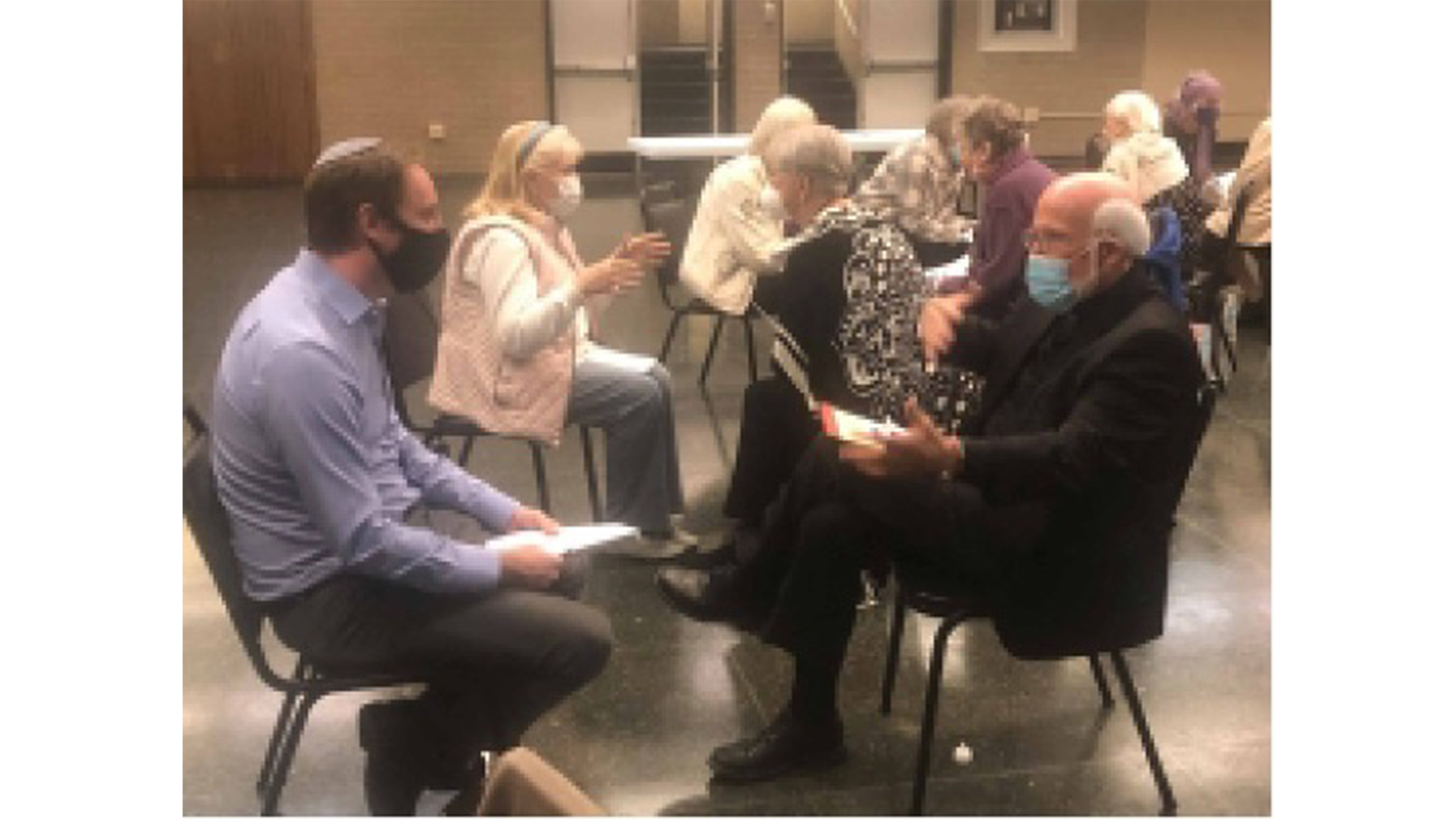
A few weeks ago, Bolton Street Synagogue, a Reform Jewish congregation where I serve as rabbi, and St. Matthew Catholic Church gathered together for an interfaith event. On that Sunday afternoon, over 30 people entered the church’s meeting hall and found seats set up in two concentric circles. Over the next hour and a half, we spent lots of time facing each other in one-on-one conversation, as we studied, listened, and shared. Many entered as strangers, but left feeling strengthened in the relationship with fellow parishioners and those from a different faith tradition.
As the event ended, Pat Jones, a lay leader at St. Matthew Catholic Church and partner in this project asked the group, “Should we do this again?” She was answered with resounding applause. I’d like to take some time to reflect upon that applause. What made this event a success? What caused a rabbi, a priest, Jewish and Catholic lay leaders, and so many others to leave the church hall feeling uplifted after a short time together?
Laughter
After our event was over, our planning group found some time to gather and reflect upon the event. One thing we kept coming back to was laughter. We believed that this was one of the main ingredients that helped this event succeed. From our early planning sessions, we were often laughing and joking with each other. All of us have good senses of humor (Elaine Crawford, Father Joe Muth, Pat Jones, Marc Wernick, Lauren Kelleher, and myself as well). I think we often fed off each other with a pun or a joke! It might not seem to be the epitome of interfaith dialogue, but I believe the laughter and joking in our planning sessions helped break down barriers and allowed for a common connection that helped us get to know one another.
In addition, Marc Wernick of Bolton Street Synagogue came up with a wonderful ice breaker for our event called “Spiritual Speed Dating.” As I shared above, we began our gathering seated in two concentric circles. We faced one another and spoke face-to-face. The questions asked were not easy. “What do you pray for?” is an example. But, in each case there was a little bit of laughter, smiles, and joking. I firmly believe that this helped each of us to become comfortable with one another, to become better listeners, and to dig deeper into our personal spiritual story.
Trust
Interreligious dialogue and interfaith gatherings are not always easy to plan or easy to attend. There can be many pitfalls to planning such an endeavor: food, timing, prayer, egalitarianism, unease, and mistrust to name a few! Yet, in our case none of these pitfalls seemed to come to fruition. I believe that this was true because of the trusting relationship that we built over time.
First, Bolton Street Synagogue and St. Matthew Catholic Church already knew of each other and had already built a relationship. The two congregations are both members of the community organizing initiative BUILD (Baltimoreans United in Leadership Development) and have been involved in various social justice projects, including the Black Lives Matter Interfaith Coalition as well as the Faith Communities of Baltimore in Pride. In addition, our clergy (myself as well as Father Joe Muth) knew and respected each other. These opportunities provided us with a foundation to begin our work.
In addition, we were able to meet and to get to know each other during our time in the ICJS Congregational Leaders Fellowship (CLF). I commend CLF Program Director Alisha Tatem and the leadership at ICJS for putting the interfaith events towards the tail end of our fellowship. This allowed the six of us from Bolton Street Synagogue and St. Matthew Catholic Church to get to know each other, to study together, to learn from each other, and to begin to build a trusting relationship. It was through these moments that we were able to begin to plan this wonderful event.
Love
We decided that our program would focus on the theme of love. Throughout the event, we studied three texts: a Jewish text from Midrash Rabbah, a Christian text from 1 Corinthians, and a text from both of our traditions from the Book of Ruth. Each of these texts focused on a different aspect of love.
I believe that by focusing our time together on love, we were able to help strengthen relationships amongst our participants. Sometimes in an interreligious dialogue, we think that we must focus on the “big” issues of the day: prayer, theology, ritual, and practice. These topics are often hard in just a singular religious gathering and even more challenging in an interfaith context. We might question God, feel anger at our religious leaders, struggle with religious beliefs or practices, which makes interfaith dialogue more difficult. By focusing on love, we addressed a universal feeling that wasn’t innately “religious.” All of us have loved and have been loved albeit in different ways. We know that feeling and what it means. It became a wonderful entree into our discussion.
Next Steps
So, what’s next? We’re not sure yet, but we know that we have a wonderful foundation built upon laughter, trust, and love! We hope to partner together on Afghan refugee resettlement and to continue our interfaith dialogue and conversations. The path is long and there will hopefully be many forks ahead, but I’m looking forward to the journey!
The ICJS Congregational Leaders Fellowship is a year long fellowship designed to connect local congregations from within the Jewish, Muslim, and Christian faith communities and expand their capacity for interreligious engagement and leadership. Throughout the year cohort members will offer reflections on interreligious leadership. Each contributor represents their own views and opinions. We welcome this diversity of perspectives and seek to foster dialogue around the topics presented.